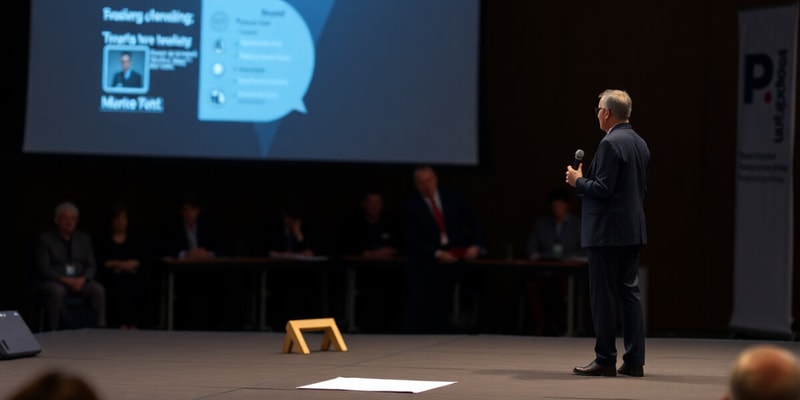Podcast
Questions and Answers
What is the primary purpose of creating an outline for a speech?
What is the primary purpose of creating an outline for a speech?
A point in the outline does not require at least two subpoints to be considered substantial.
A point in the outline does not require at least two subpoints to be considered substantial.
False
What is the standard font size recommended for a Preparation Outline?
What is the standard font size recommended for a Preparation Outline?
12 point
The Preparation Outline is also known as the __________ Outline.
The Preparation Outline is also known as the __________ Outline.
Signup and view all the answers
Match the outlining symbols to their corresponding levels:
Match the outlining symbols to their corresponding levels:
Signup and view all the answers
Which of the following is NOT a part of the speech preparation process?
Which of the following is NOT a part of the speech preparation process?
Signup and view all the answers
Transitions in a speech only serve to connect the introduction and conclusion.
Transitions in a speech only serve to connect the introduction and conclusion.
Signup and view all the answers
What is defined as a connecting word or phrase that separates key points in a speech?
What is defined as a connecting word or phrase that separates key points in a speech?
Signup and view all the answers
Writing in full sentences forces you to think in complete __________.
Writing in full sentences forces you to think in complete __________.
Signup and view all the answers
How should the Preparation Outline be formatted?
How should the Preparation Outline be formatted?
Signup and view all the answers
What is the primary purpose of notecards during a presentation?
What is the primary purpose of notecards during a presentation?
Signup and view all the answers
Notecards should contain as much information as possible to ensure the speaker remembers everything.
Notecards should contain as much information as possible to ensure the speaker remembers everything.
Signup and view all the answers
What should be avoided when preparing notecards to maintain credibility?
What should be avoided when preparing notecards to maintain credibility?
Signup and view all the answers
A proper outline helps to keep you from __________ and keeps you __________.
A proper outline helps to keep you from __________ and keeps you __________.
Signup and view all the answers
Which of the following is NOT a common organizational strategy for presentations?
Which of the following is NOT a common organizational strategy for presentations?
Signup and view all the answers
Color coding notecards can help keep the speaker organized.
Color coding notecards can help keep the speaker organized.
Signup and view all the answers
What can lead to common organizational problems in student presentations?
What can lead to common organizational problems in student presentations?
Signup and view all the answers
If you use one color pen and have __________ handwriting, it can lead to confusion.
If you use one color pen and have __________ handwriting, it can lead to confusion.
Signup and view all the answers
Match the organizational strategies with their descriptions:
Match the organizational strategies with their descriptions:
Signup and view all the answers
How many notecards should a speaker aim to use at maximum?
How many notecards should a speaker aim to use at maximum?
Signup and view all the answers
Study Notes
Outlining & Organizing Speeches
- Outline: A blueprint for a speech, forcing speakers to organize their thoughts.
-
Preparation Outline: A detailed, full-sentence outline used for planning and practicing a speech.
- Typed, double-spaced, 12-point font.
- Uses Roman numerals for main points, capital letters for primary subpoints, and numbers for secondary subpoints.
-
Transitions: Crucial connectors between key points that improve delivery effectiveness, organization, and audience retention.
- Include transitions between introduction and main points, between main points, and leading to the conclusion.
-
Presentation Outline: A condensed version of the preparation outline, designed for notecards used during delivery.
- Contains less detail, as the speaker should know much of the speech by memory.
- Acts as a compass and aid in case of forgetting.
-
Notecard Tips:
- Use notecards for practice, not just for presentation.
- Color coding can improve organization.
- Clearly written notecards are essential for credibility.
-
Organizational Patterns: Common strategies for structuring speeches:
- Chronological: Arranging information sequentially or in order of time.
- Spatial: Organizing information based on physical arrangement or location.
- Causal: Presenting information based on cause and effect.
- Comparative: Organizing information through comparison and contrast.
-
Common Organizational Problems:
- Time Mismanagement: Not allocating sufficient time to each section, resulting in speeches that are too short or long.
- Main point misdistribution: Spending too much time on one point and not enough on others.
- Lack of a proper organizational pattern: This is less common.
-
Solutions to Organizational Problems:
- A carefully crafted preparation outline is crucial.
- Thorough practice helps prevent “drifting” and keeps the speaker “on point."
Studying That Suits You
Use AI to generate personalized quizzes and flashcards to suit your learning preferences.
Description
Explore the essential elements of speech preparation with this quiz. Learn about effective outlining techniques, transitions, and tips for using notecards during presentations. Enhance your public speaking skills and organization with practical insights.




